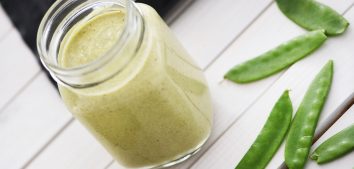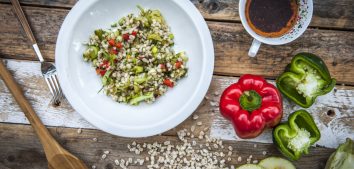
Infection Season
Spring is one of my favorite seasons. This is the time when nature comes to life after winter dormancy. The spring solstice time, however, favors higher incidence of infections and colds. How can you protect yourself from falling ill? The right diet can play an important role. The way you season your dishes is also important. Below I have prepared for you a list of spices (and not only) which have a beneficial effect on our immune system.
Black cumin
It has strong antibacterial, anti-fungal and antiviral properties. Black cumin can be consumed in the form of spices or infusion. When used as a spice, it can substitute pepper. It works great as an addition to bread, soups, salads or stewed vegetables. You can prepare an infusion of black cumin the same way you make tea. You should pour boiling water over black cumin and brew it for about 15 minutes.
Garlic
The mixture of volatile compounds (mainly sulfuric) contained in garlic acts bactericidal, destroys numerous microorganisms, yeasts, fungi and viruses. Garlic reduces spasms and inflammation, stimulates the secretion of mucus, facilitates expectoration, and also relieves the feeling of shortness of breath. The most effective here is garlic that is freshly grated or cut into pieces, or freshly squeezed juice. More information about garlic properties can be found HERE.
Liquorice
The results of clinical studies indicate that the ingredients extracted from liquorice roots have numerous biological properties, such as antiviral, antibacterial, antifungal, anti-inflammatory and many others. It is recommended to consume between 5 to 15 g of liquorice root daily. Note – its long use may cause an increase in blood pressure. Therefore, liquorice is not recommended for people with hypertension.
Oregano
Medicinal plant and spice in one. Oregano is also used in pharmacotherapy, due to its antimicrobial, antifungal and antiparasitic properties. As for me, this is the number one plant when it comes to antimicrobial protection. Of the three of my favorite herbs, which are basil, thyme and oregano, it is oregano that has the strongest antibacterial effect. Oregano has a high antioxidant potential. The bioactive components contained in it protect the body against free radical reactions. Oregano is also used in the prevention of cancer.
Basil
Basil is my queen of pot herbs. I especially like Italian cuisine. It goes perfectly with pasta and tomatoes. I make my favorite pesto from basil. It has anti-inflammatory and antibacterial properties. It works well for problems with the digestive system, because it stimulates the secretion of gastric juice.
Rosemary
Rosemary is mainly used in our kitchen as a flavor enhancer. However, rosemary is a good source of polyphenols – compounds with antioxidant properties which fight against free radicals and have anti-inflammatory and antibacterial properties.
Turmeric
A decisive leader among all spices. It is most often added to cocktails. I prepare a magical tonic with it: https://healthyplanbyann.com/poranny-tonik-z-kurkuma-do-picia/, which I call a healthy bomb! Turmeric has anti-inflammatory and antibacterial as well as antioxidant properties.
Ginger
I add ginger to cocktails, soups and even tea. I use ginger every day, especially during autumn and winter. As shown in many studies, ginger consumption proves to have enormous health and healing benefits. Like cinnamon, it has antidiabetic properties and also has a positive effect on the lipid profile of the blood. It has antibacterial and antifungal properties. I recommend ginger to all who want to keep their youth for a long time, because ginger has a high antioxidant potential, and therefore antiradical activity.
Cinnamon
It is obtained from the bark of a cinnamon tree and its homeland is Ceylon (Sri Lanka). What do I value it most for? For the aroma – I can not imagine baking at Christmas, I can not imagine apple pie, millet porridge or other dishes without cinnamon. In addition, I value its pro-health properties. First, cinnamon improves digestion, stimulates the secretion of bile and digestive juices, helps with flatulence, diarrhoea, heartburn and ulcers. The active ingredients contained in cinnamon are among the strongest natural antiseptics (antibacterial and antifungal properties), used in the treatment of, among others, colds and flu. Studies carried out so far have shown that cinnamon may play a role in the prevention and treatment of diabetes, cancer and cardiovascular diseases. Cinnamon is on top when it comes to products with the strongest antioxidant properties, and I’m sure my dear ladies that you are interested in this piece of information.
Ghee
In my recipes I use ghee butter very often. I value it because of the excellent culinary qualities. Thanks to the high temperature of smoking (up to 250 degrees), butter does not burn, hence it is more and more often chosen as a fat for cooking different types of dishes. Clarified butter is also a good source of vitamin E with antioxidant properties. In addition, after its consumption the level of interferon increases, which stimulates our immune system to fight the cold.
References:
- Kaławaj K, Lemieszek MK. Prozdrowotne właściwości cynamonu. Medycyna Ogólna i Nauki o Zdrowiu 2015, 21 (3): 328-331.
- Kania M, Baraniak J. Kurkumina – prozdrowotny barwnik kurkumy. Problemy Higieny i Epidemiologii 2015, 96 (2): 414-420.
- Kucharsa-Ambrożej K. Aktualny stan wiedzy na temat chemizmu i aktywności biologicznej lukrecji gładkiej Glycyrrhiza glabra L. Post Fitoter 2017; 18(2): 158-161.
- Kulczyński B, Gramza-Michałowska A. Znaczenie żywieniowe imbiru. Bromatologia i CHemia Toksykologiczna, 2016, XLIX (1): 57-63
- Opara EI, Chohan M. Culinary Herbs and Spices: Their Bioactive Properties, the Contribution of Polyphenols and the Challenges in Deducing Their True Health Benefits. International Journal of Molecular Sciences 2014, 15: 19183-19202.









Comments No Comments
Join the discussion…